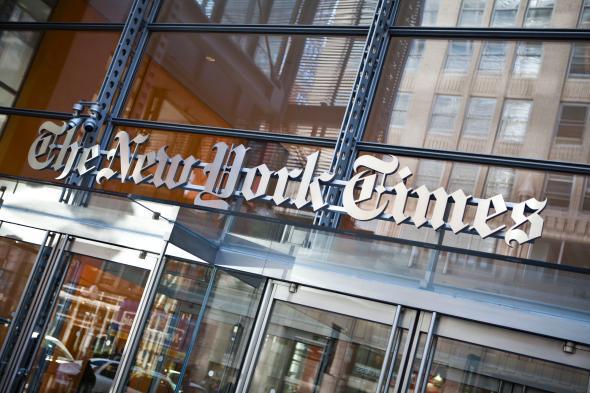The New York Times unveiled its annual roundup of “100 Notable Books” Tuesday, throwing a flattering light on 2014’s top fiction and nonfiction offerings. But one author did not come off in a flattering light: Ayelet Waldman stormed Twitter to complain that her novel Love and Treasure wasn’t on the list, despite a favorable review from the Times back in May. (For what it’s worth, Waldman’s skin seems to have unique, flattering-light-repellant properties. She’s a provocateur who has detailed the trials of perhaps not loving her children enough and of being the only mother in her social circle to enjoy a passionate, consuming sex life.)
Waldman’s opening shot:
“I am really not dealing well with having failed to make the @nytimes notable book list. Love & Treasure is a fucking great novel IISSM.”
(IISSM in this context means neither the International Institute of Security and Safety Management nor the Invisible Idiocracy of Snubbing Stellar Manuscripts, but “if I say so myself.” Waldman has since deleted her tweets, but you can see them on The Daily Dot.)
She continues:
“I never complain about this shit, but there are MANY books on that notable list with reviews that were NOWHERE near as good as mine.”
“What do they mean by ‘Notable?’ How does a book that got a decidedly mediocre review count as “notable” when one with a good one doesn’t?”
“Sometimes “being a writer” totally sucks. If it weren’t for the actual writing, I think I’d go back to being a criminal defense attorney.”
“It’s just so fucking demoralizing. You pour your heart into your work, you get awesome reviews, and then someone decides it’s not ‘notable.’”
“I mean. Why do I bother? I could write a fucking journal.”
“I’m sorry I’m being such a pussy. There are real problems in the world. I’m just going to suck it up and do something good for someone else.”
“You know what? Do me a favor. Preorder my fucking paperback to make me feel better.”
“For every preorder I’ll donate $1 to http://www.scholarmatch.com . Fuck the fucking NY Times.”
Waldman, who is again no stranger to public criticism, came in for plenty of mockery. “Ayelet Waldman…has written a blog about her disgust at being left out of the new Bond cast. And that it’s not called Ayelet,” tweeted Patrick Ness. And Joanne Harris lamented in faux-solidarity: “I should have a Nobel Prize by now. And a pastel pony of my very own.” Yet the Bad Mother author doesn’t regret her outburst and has posted a defense of her behavior to Facebook. There’s something fetchingly bravura about this mix of honesty, extravagance (nine whole tweets to slam a subjective list of faves?), and diva-dom. Plus, Waldman raises an interesting point: How do the books get chosen, anyway?
“We’ve had some form of the ‘Notable Books’ [feature] for a long time,” New York Times Book Review editor Pamela Paul told me. The paper used to publish a weekly column, “And Bear in Mind,” that highlighted titles the editors believed worthy of “particular literary, topical or scholarly interest.” Then, during the tenure of Paul’s predecessor Sam Tanenhaus, the rubric was reborn as “Editor’s Choice.” At the end of each year, Paul explained, all of the volumes called out in “Editor’s Choice,” née “And Bear in Mind,” ascend to one grand “Notable Books” roundup, like the souls of the saved rising to heaven. That list is now narrowed down to 100 books, 50 fiction and 50 nonfiction.* The group simply represents “the best books we’ve reviewed that year,” said Paul. “It’s quality. What other criteria would there be?”
I suggested a few lowlier metrics, like sales, impact, and cultural omnipresence.
“Well, we do hope that there’s some overlap between quality and newsworthiness and attention,” Paul said, “though that doesn’t have to be the case.”
Has she been following the Waldman Twitterstorm?
“Every year there are people that are unhappy that this book, that book, their book, didn’t make the list,” Paul said tactfully. “One hundred seems like an awfully big number,” but in fact the Times only has space to review 1 percent of any given annum’s published titles. Of those volumes, only a tiny fraction can appear in the December spotlight. “We’re not scraping the bottom of the barrel” with Notable Books, Paul emphasized. “There’s a huge body of work out there, and every year there are narrow misses that an editor, two editors, five editors, feel bad about leaving off.”
But, according to Paul, the real pressure comes in when Book Review staffers have to select the 10 Best Books of the year. We know that pain. Here are Slate’s picks, as well as our favorite overlooked titles and incandescent lines. (Sorry, Ayelet Waldman! You are definitely on our 2014 docket of most entertaining literary Twitter rants.)
*Correction, Dec. 5, 2014: This post originally misstated that all Editor’s Choice books are still included in the Notable Books roundup. Since 2004, only 100 are.
